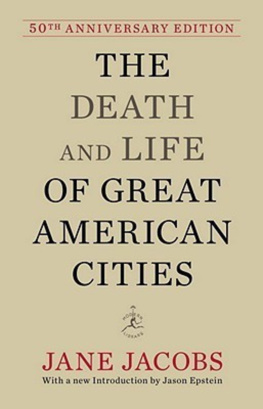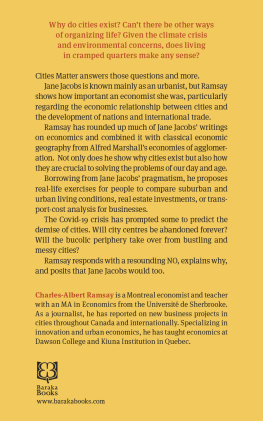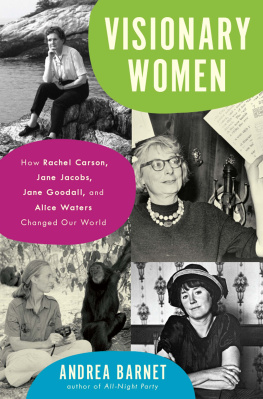Jane Jacobs - The Nature of Economies
Here you can read online Jane Jacobs - The Nature of Economies full text of the book (entire story) in english for free. Download pdf and epub, get meaning, cover and reviews about this ebook. year: 2001, publisher: Vintage Canada, genre: Art. Description of the work, (preface) as well as reviews are available. Best literature library LitArk.com created for fans of good reading and offers a wide selection of genres:
Romance novel
Science fiction
Adventure
Detective
Science
History
Home and family
Prose
Art
Politics
Computer
Non-fiction
Religion
Business
Children
Humor
Choose a favorite category and find really read worthwhile books. Enjoy immersion in the world of imagination, feel the emotions of the characters or learn something new for yourself, make an fascinating discovery.

- Book:The Nature of Economies
- Author:
- Publisher:Vintage Canada
- Genre:
- Year:2001
- Rating:5 / 5
- Favourites:Add to favourites
- Your mark:
- 100
- 1
- 2
- 3
- 4
- 5
The Nature of Economies: summary, description and annotation
We offer to read an annotation, description, summary or preface (depends on what the author of the book "The Nature of Economies" wrote himself). If you haven't found the necessary information about the book — write in the comments, we will try to find it.
The Nature of Economies — read online for free the complete book (whole text) full work
Below is the text of the book, divided by pages. System saving the place of the last page read, allows you to conveniently read the book "The Nature of Economies" online for free, without having to search again every time where you left off. Put a bookmark, and you can go to the page where you finished reading at any time.
Font size:
Interval:
Bookmark:
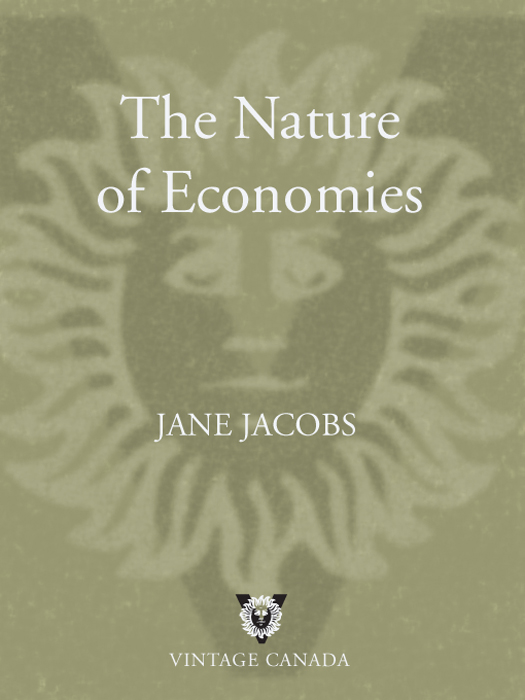
THE #1 NATIONAL BESTSELLER
The Nature of Economies is a playful, vigorous book, one that insists we see our working lives in a new way, as a web of relationships shared with other life forms.
Quill & Quire
While the structure of the book is a spirited and sometimes feisty conversation and argument between friends, the ideas about economic regeneration and ecological diversity have practical application. Jacobs offers a refreshingly imaginative organic vision of how things connect with each other.
The Hamilton Spectator
An impassioned, quixotic proponent of process, of questioning and thinking deeply.
The Georgia Straight
Its ideas will resonate deeply in the new millennium as they demand a new way to appreciate our place in the natural order of the world.
Winnipeg Free Press
Witty, beautifully written. The culmination of Jacobs previous thinking, and a step forward that deftly invokes a broader philosophical, even metaphysical context.
Publishers Weekly
ALSO BY JANE JACOBS
The Death and Life of Great American Cities
The Economy of Cities
The Question of Separatism
Cities and the Wealth of Nations
Systems of Survival
A Schoolteacher in Old Alaska
The Nature of Economies
Jane Jacobs was born in Scranton, Pennsylvania, and since 1968 has lived in Toronto, where she has taken an active role in helping to shape the city. Her previous books include The Death and Life of Great American Cities (1961), The Economy of Cities (1968), The Question of Separatism (1980), Cities and the Wealth of Nations (1984), Systems of Survival (1993), and A Schoolteacher in Old Alaska (1996).
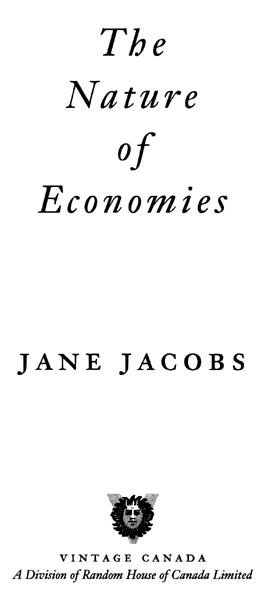
VINTAGE CANADA EDITION, 2001
Copyright 2000 by Jane Jacobs
All rights reserved under International and Pan-American Copyright Conventions. Published in Canada by Vintage Canada, a division of Random House of Canada Limited, in 2001. Originally published in hardcover in Canada by Random House Canada, Toronto, in 2000. Distributed by Random House of Canada Limited, Toronto.
Vintage Canada and colophon are registered trademarks of Random House of Canada Limited.
Canadian Cataloguing in Publication Data
Jacobs, Jane, 1916
The nature of economies
eISBN: 978-0-307-36708-2
1. EconomicsEnvironmental aspects. 2. Biotic communities.
I. Title.
HD75.6.J31 2001 330 C00-932391-0
Visit Random House of Canada Limiteds Web site:
www.randomhouse.ca
v3.1
For Burgin, Ned, and Jim
Theories and other abstractions are powerful tools only in the limited sense that the Greek mythological giant Antaeus was powerful. When Antaeus was not in intimate contact with earth, his strength rapidly ebbed. The aim of the talkative characters in this book is to bring rarefied economic abstractions into contact with earthy realities, meaning universal natural processes of development, growth, and stability that govern economic life.
The theme running throughout this expositionindeed, the basic premise on which the book is constructedis that human beings exist wholly within nature as part of natural order in every respect. To accept this unity seems to be difficult for those ecologists who assumeas many do, in understandable anger and despairthat the human species is an interloper in the natural order of things. Neither is this unity easily accepted by economists, industrialists, politicians, and others who assumeas many do, taking understandable pride in human achievementsthat reason, knowledge, and determination make it possible for human beings to circumvent and outdo the natural order. Readers unwilling or unable to breach a barrier that they imagine separates humankind and its works from the rest of nature will be unable to hear what this book is saying.
In describing natural processes and selecting examples to illustrate them, I have hewed to information from the fields of biology, evolutionary theory, ecology, geology, meteorology, and other natural sciences as the information is currently understood and interpreted by practitioners in these sciences. When, on infrequent occasions, my characters introduce their own interpretations of natural science, they make it clear that these are their own speculations. On economics they are much more opinionated in their insistence that it come down to earth, but again they state out-rightly when they are being iconoclastic, and why.
I have used imaginary characters and didactic dialogue primarily because this venerable literary form is suited to expounding inquiry and developing argument, but also because the form implicitly invites a reader to join the characters and enter the argument too. A book is equipped to speak for itself, more so than any other artifact. But to be heard, a book needs a collaborator: a reader with a sufficiently open mind to take in what the book is saying and dispute or agree, but in any case think about it. Insofar as that process is enjoyably interesting as well as possibly usefulas I hope it may beso much the better.
J ANE J ACOBS
Toronto July 1999
DAMN, ANOTHER ECOLOGIST
Hortense and Ben have broken up, said Armbruster, waving a fax at Kate as she slid into the booth, balancing her cup of coffee.
Im sorry but not surprised, said Kate. Remember how Ben used to gloat over industrial disasters? He thought everything industrial or technological was unnatural and that everything unnatural was bad.
He meant well, Armbruster said. We need Jeremiahs, but it must have been depressing for Hortense to live with one. It seems the breakup happened some time ago and shes gotten over it. Shes interested in a new man. Mind if I finish this fax? I only got it as I was leaving the house.
In late morning they were sitting in an almost-empty coffee shop on lower Fifth Avenue, not far from Armbrusters Gramercy Square apartment. It was an unappealing restaurant in a stretch of New York rapidly going upscale. Armbruster liked it as his morning hangout because its well-deserved unpopularity guaranteed seats for acquaintances dropping by. He lived alone, and since his retirement from a small book publishing company, he missed his work and its daily give-and-take with colleagues.
Damn, Hortense has found another ecologist, Armbruster grumbled as he continued reading the fax.
Thats not surprising, either, said Kate. Shes an environmental lawyer, so those are the people she talks to, consorts with. Those and other lawyers.
But listen to this: His name is Hiram Murray IV. The Fourth! What an affectation.
Hes not to blame if his family ran out of names.
You drop off the numbers when they die. I dropped off my Junior when my father died. Only kings and popes hang on to numbers.
Maybe the other three are still aliveyou dont know.
Lets see, Armbruster mused aloud. Number two would be his grandfather, and number one His eyes widened, exaggerating his customary owlish expression. Good heavens, Hortense is fifty. You dont suppose
No, I dont think Hortense is running around with a kid. Read on.
Font size:
Interval:
Bookmark:
Similar books «The Nature of Economies»
Look at similar books to The Nature of Economies. We have selected literature similar in name and meaning in the hope of providing readers with more options to find new, interesting, not yet read works.
Discussion, reviews of the book The Nature of Economies and just readers' own opinions. Leave your comments, write what you think about the work, its meaning or the main characters. Specify what exactly you liked and what you didn't like, and why you think so.

